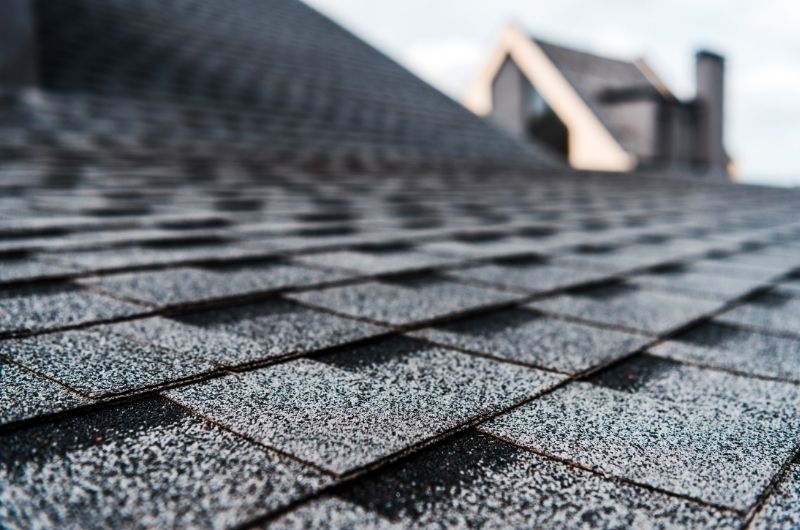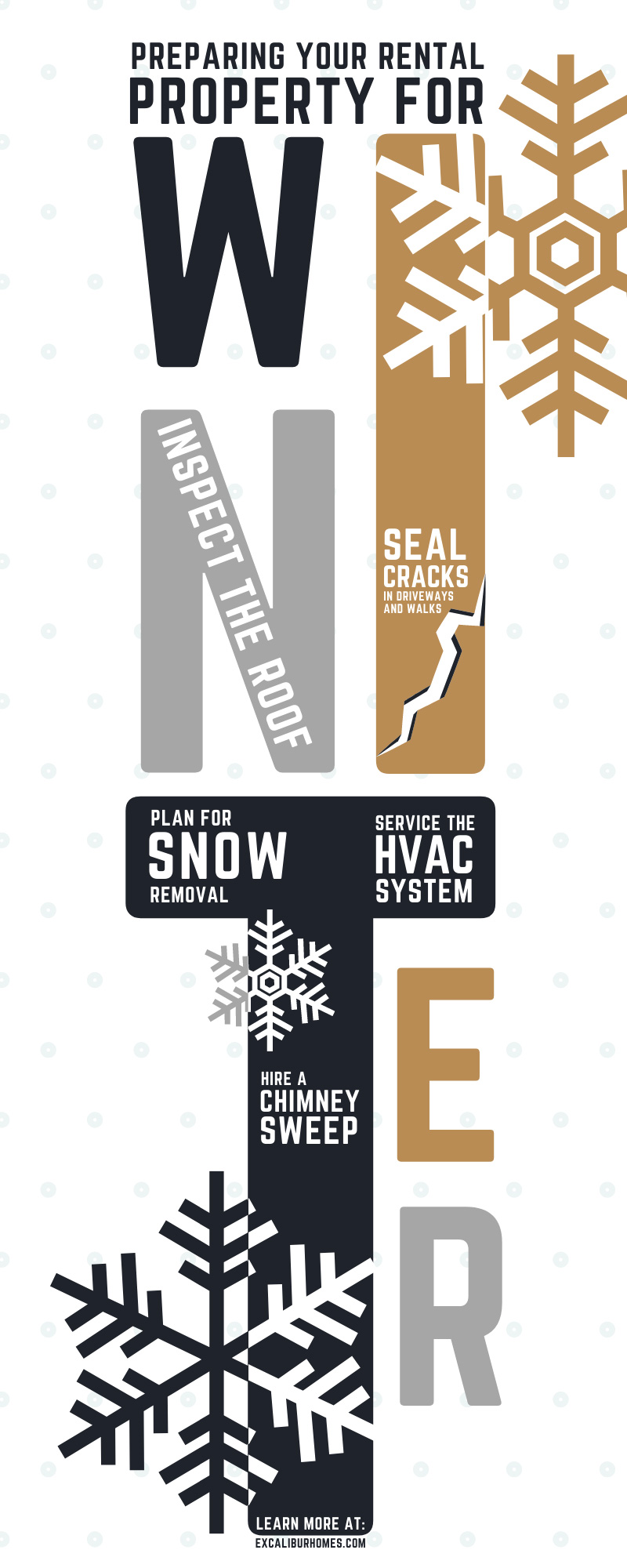
Maintenance of a rental home is a team effort between property owners and tenants. Preparing your rental property for winter can reduce the risk of costly failures like roof leaks, burst pipes, or chimney fires. It can also save energy during colder months. Property owners are responsible for maintaining safe and livable conditions, while tenants are responsible for keeping the place clean, the heat on, the walks clear, and for reporting any problems such as burst pipes or rodent intrusions. Living in a warmer climate is no longer a guarantee that your property will never experience a hard freeze, snowstorm, or ice storm. Take steps now to minimize risk to your property and your tenants.
Inspect the Roof
Make sure the roof of the home is ready for winter precipitation. Look for damaged or missing shingles, cracked seals around vent pipes, and any damage under the eaves. Hire a licensed professional roofer to conduct a thorough check and address any problems before frost, ice, or snow make it impossible to safely conduct repairs.
Clean the Gutters and Remove Hazardous Branches
Clogged gutters cause ice dams, which damage roofs and cause leaks and water damage. Clean all gutters of debris and make sure downspouts are clear. Add extensions, if necessary, to carry rain and meltwater away from the home’s foundation and direct it away from hardscapes—you don’t want water from the roof to end up as ice in the driveway or on the front walk.
Shut Off Water to Exterior Faucets and Detach Hoses
Water expands when it freezes, and exposed, uninsulated pipes are at risk of bursting. Turn off the water supply to outside faucets and detach and store garden hoses. Cover exterior faucets and insulate pipes that run through any unheated areas of the home, like attics or crawlspaces.
Hire a Chimney Sweep
A fireplace is a great amenity for tenants to enjoy a warming blaze in the winter. Chimneys should be inspected and cleaned annually, at a minimum, to check for blockages, cracks, and creosote buildup. Clogged chimneys can cause dangerous buildups of carbon monoxide or other fumes, and creosote buildup on the chimney walls can cause chimney fires.
Check Door and Window Weatherstripping
Homes can lose a lot of heat through poorly sealed windows and doors. Replace cracked or failing caulk and weatherstripping and seal any cracks around windows and doors.
Service the HVAC System
Hire a licensed professional to inspect and prepare the HVAC system for winter. Property owners will save on repairs with preventative maintenance. Fixing the heat now, changing the filters, and ensuring the system works as it should will reduce the risk of leaving your tenants without heat or hot water for days when heating pros are busy with emergency calls all over town. Your AC unit also needs protection from the elements, so it doesn’t become clogged with leaves and winter debris.
Test All Alarms
Make sure all smoke and carbon monoxide detectors in the home are in good working order. Replace batteries and test all alarms.
Plan for Snow Removal
Make sure your contract for snow removal is current and includes all the services needed, from clearing driveways to shoveling and de-icing walks. Clarify responsibilities for marking the perimeter of the drive, and keeping cars out of the way so your snowplow contractor can clear the driveway completely.
Seal Cracks in Driveways and Walks
Small cracks turn into large problems when water gets in, freezes, and expands. Seal cracks now to prevent further damage to concrete walks and driveways. Spring repairs may be necessary anyway, but they’ll be less extensive if you prepare your rental property for winter weather.
Double Check Your Insurance
Pull out your insurance policies and remind yourself of what’s covered and what isn’t. Check for coverage on things like water damage from burst pipes, roof damage from ice damming or fallen branches, and slip and fall accidents. Find out if your insurance will pay for emergency repairs when the heat breaks down, ice damages a gutter, or high winds break a window.
Prepare Your Tenants
Take some time to prepare a readiness checklist for your tenants. Advise them to keep the heat on to at least 55 degrees to avoid frozen pipes, and to let faucets drip a little through nights when frigid temperatures are expected. Show them where the main water shutoff valve is located.
Tenants will appreciate reminders about how to get through storms and power outages. Advise them to have flashlights, batteries, water, and a supply of non-perishable food on hand. Make sure they know how to contact you or your property management company in the event of an emergency.
Many leases for single family homes require tenants to handle snow removal and deicing around walks and entryways. This means they’ll need shovels and salt (recommend the kind that’s gentler on landscaping but effective to melt ice on driveways and sidewalks). Remind tenants also to stow summer patio furniture, check their wiper blades, and throw a window brush and scraper in the car.
Vacant Properties Need Special Attention
Well-managed properties have high occupancy rates, and vacancies shouldn’t last through a winter. But properties go unoccupied because of repairs, upgrades, and unexpected tenant departures. Check unoccupied properties as thoroughly as you would if the home wasn’t vacant. Maintaining heat and insulating pipes is especially important if no one will be home to notice when a pipe bursts.
If you own summer or vacation properties that you know will be unoccupied for the entire season, you have more work to do. Turn off the water, drain the pipes, and leave the heat on. Clean out the fridge, wipe it dry, unplug it and leave it open. Drain toilet tanks, but prevent drain traps from drying out and admitting sewer gas into the home by covering toilet seats with plastic wrap. Clean and store linens and vacuum rugs. Leave the heat on, but turn off other appliances if it is safe to do so. Store non-perishable foods in animal-proof chests or containers. Shut the chimney flue and make sure the chimney cap is intact to keep animals out. Arrange for a permanent resident of the area to check on the home weekly to ensure there has been no damage after a storm or animal infestation.
Excalibur Home provides Georgia lease and property management services. Real estate investors with properties in the greater Atlanta metro area can call on Excalibur to provide expert management, including preparing rental homes for winter.




